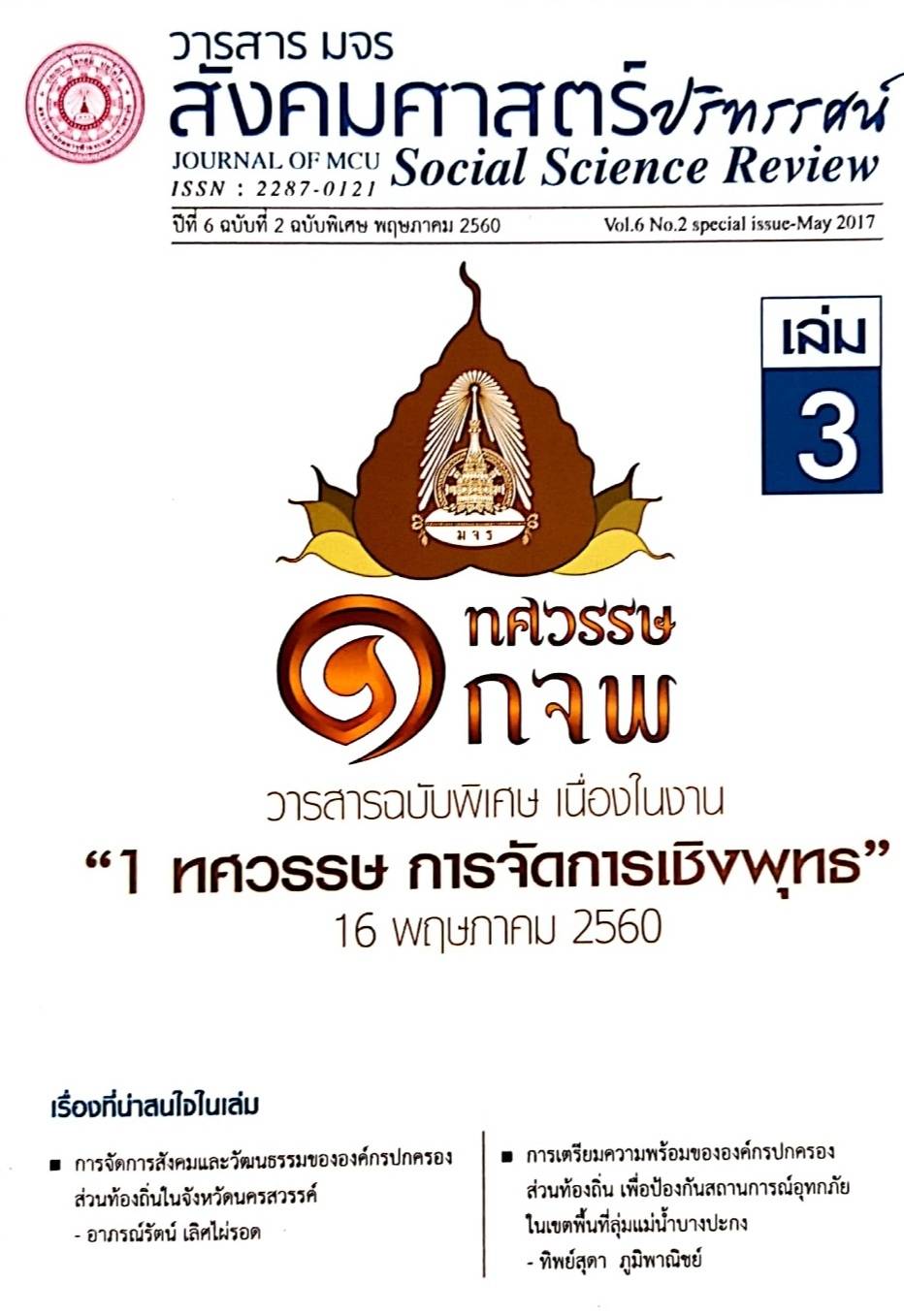การมีส่วนร่วมตามแนวพระพุทธศาสนาของประชาชนในการดำเนินงาน ของสภาองค์กรชุมชนในจังหวัดชลบุรี
คำสำคัญ:
สภาองค์กรชุมชน, การดาเนินงาน, การมีส่วนร่วมของประชาชนบทคัดย่อ
การวิจัยครั้งนี้มีวัตถุประสงค์ คือ 1) เพื่อศึกษาสภาพปัจจุบันของการมีส่วนร่วมตามแนวพระพุทธศาสนาของประชาชนในการดาเนินงานของสภาองค์กรชุมชนในจังหวัดชลบุรี 2) เพื่อศึกษาแนวคิด ทฤษฎีและหลักธรรมที่เกี่ยวข้องกับการมีส่วนร่วมของประชาชนต่อการดาเนินงานของสภา
องค์กรชุมชนในจังหวัดชลบุรี 3) เพื่อนำเสนอรูปแบบการมีส่วนร่วมตามแนวพระพุทธศาสนาของประชาชนในการดำเนินงานของสภาองค์กรชุมชนในจังหวัดชลบุรี ซึ่งมีวิธีดำเนินการวิจัยเชิงคุณภาพ(Qualitative Research) เก็บรวบรวมข้อมูลโดยการสัมภาษณ์เชิงลึกจากผู้ให้ข้อมูลสำคัญ จำนวน21 คน และการสนทนากลุ่ม จ านวน 12 รูป/คน การวิเคราะห์ข้อมูลใช้วิธีการวิเคราะห์เชิงเนื้อหา(Content Analysis) โดยใช้เทคนิคการวิเคราะห์ข้อมูลแบบหลัก SWOT Analysis และ เทคนิค6’C Technique Analysis
ผลการวิจัยพบว่า
1) สภาพปัจจุบันในการมีส่วนร่วมตามแนวพระพุทธศาสนาในการดาเนินงานของสภาชุมชนจังหวัดชลบุรีด้านการตัดสินใจ เกิดจากพลังยึดเหนี่ยวจิตใจจากกระแสพระราชดำรัสพระบาทสมเด็จพระเจ้าอยู่หัว และแนวทางจากหลักเศรษฐกิจพอเพียง ความศรัทธาในผู้นาและหลักศาสนา ด้านการดาเนินงาน มีการรวมตัวจัดตั้งสภาองค์กรชุมชน นาเสนอและขับเคลื่อนแผนพัฒนามีการดาเนินงานเป็นรูปธรรม วิเคราะห์ปัญหา และแก้ไขอย่างเป็นระบบ ด้านการรับผลประโยชน์ มีสังคมที่อบอุ่น มีสุขภาวะที่ดีทั้งทางร่างกายและจิตใจ มีความสมดุลทางเศรษฐกิจ สังคม ทรัพยากรและสิ่งแวดล้อม ด้านการตรวจสอบ และประเมินผลของประชาชน มีการปรึกษาหารือเสนอแนะแนวทางแก้ไขและแนวทางการพัฒนา การประเมินผลจากการจัดให้มีเวทีเพื่อแสดงความคิดเห็นในโครงการหรือกิจกรรมขององค์การปกครองส่วนท้องถิ่น การเสนอแนะปัญหา แนวทางแก้ไขและแนวทางการพัฒนาคุณภาพสิ่งแวดล้อม และคุณภาพชีวิตของประชาชน มีการเก็บข้อมูลเกี่ยวกับกลุ่มองค์กรชุมชน การสำรวจกลุ่มองค์กรชุมชน การจัดตั้งสภาองค์กรชุมชนใหม่ การเชื่อมโยงองค์กรชุมชน ท้องถิ่นและท้องที่ในการจัดสวัสดิการให้ครอบคลุมทุกระดับและชุมชน
2) แนวคิด ทฤษฎีและหลักธรรมที่เกี่ยวข้องกับการมีส่วนร่วมตามแนวพระพุทธศาสนาของประชาชนในการดำเนินงานของสภาองค์กรชุมชนในจังหวัดชลบุรี ได้แก่ ทฤษฎีการมีส่วนร่วมของประชาชนของ Cohen, J.M. & Uphooff, N.T แบ่งเป็น 4 ด้านได้แก่ 1) การมีส่วนร่วมในการตัดสินใจ 2) การมีส่วนร่วมในการดาเนินกิจกรรม 3) การมีส่วนร่วมในการรับผลประโยชน์ 4) การมีส่วนร่วมในการตรวจสอบและประเมินผล และหลักอปริหานิยธรรม 7 ประการ คือ 1) การหมั่นประชุมกันเนืองนิตย์ 2) การพร้อมเพรียงกันประชุมและพร้อมเพรียงกันเลิกประชุม 3) การไม่บัญญัติหรือล้มเลิกข้อบัญญัติตามอำเภอใจ 4) การเคารพเชื่อฟัง ผู้นาปราชญ์ ผู้รู้ ผู้อาวุโส 5) การให้เกียรติและเคารพสิทธิสตรี 6) การรักษาวัฒนธรรมประเพณี 7) การอารักขา คุ้มครองโดยชอบธรรมแก่ผู้ทรงศีล ผู้ทรงธรรมบริสุทธิ์
3) รูปแบบการมีส่วนร่วมตามแนวพระพุทธศาสนาของประชาชนในการดาเนินงานของสภาองค์กรชุมชนจังหวัดชลบุรีตามหลักอปริหานิยธรรม มี 4 รูปแบบ ได้แก่ 1) รูปแบบการมีส่วนร่วมของประชาชนด้านการตัดสินใจโดยประชาชนมีความเสียสละเพื่อส่วนรวม มีสัจจะร่วมกันสร้างสรรค์สังคม ใช้คุณธรรม จริยธรรมนาทาง 2) รูปแบบการมีส่วนร่วมของประชาชนด้านการดำเนินงานโดย สร้างธรรมนูญชุมชน สร้างภูมิปัญญาท้องถิ่น สร้างค่านิยมร่วมของชุมชนเป็นสังคมแห่งคนดีมีคุณธรรม 3) รูปแบบการมีส่วนร่วมของประชาชนด้านรับผลประโยชน์โดย นาสังคมไปสู่ธรรมาธิปไตย เกิดเอกลักษณ์ชุมชน เกิดอัตลักษณ์ชุมชน เป็นสังคมแห่งคนดี มีคุณธรรม เป็นการสร้างสรรค์สังคมแห่งความดี ประชาชนมีคุณภาพชีวิต 4) รูปแบบการมีส่วนร่วมของประชาชนด้านตรวจสอบ ประเมินผลโดยประชาชนร่วมกันประเมินสถานการณ์อยู่เสมอ หาแนวทางแก้ไขโดยใช้หลักสันติวิธี ผู้ มีวัฒนธรรมที่สืบทอดธรรมทายาททางพระพุทธศาสนา มีความยั่งยืน เกิดองค์กรแห่งคุณธรรม จริยธรรม
เอกสารอ้างอิง
ประสาน บุญโสภาคย์. และคณะ. (2552). “รายงานการศึกษาพระราชบัญญัติสภาองค์กรชุมชนพ.ศ. 2551”.รายงานผลการวิจัย. กรุงเทพมหานคร: สถาบันพัฒนาองค์กรชุมชน.องค์การมหาชน.
ปรียา โสภณา. (2553). “ปัจจัยเชิงสาเหตุที่มีผลต่อความเข้มแข็งของหมู่บ้านชุมชนชนบทภาคตะวันออกเฉียงเหนือตอนล่างของประเทศไทย”. วิทยานิพนธ์ปรัชญาดุษฎีบัณฑิตสาขาวิชายุทธศาสตร์และพัฒนาภูมิภาค. บัณฑิตวิทยาลัย: มหาวิทยาลัยราชภัฏมหาสารคาม.
พรรทิพย์ เพชรมาก. (2550). สภาองค์กรชุมชน: รวมพลังสร้างความเข้มแข็งของชุมชน.กรุงเทพมหานคร: สถาบันพัฒนาองค์กรชุมชน (องค์กรมหาชน).
ภาส ภาสสัทธา. (2558). “การบูรณาการหลักพุทธธรรมในการบริหารจัดการด้านความโปร่งใสขององค์กรปกครองส่วนท้องถิ่น”. วิทยานิพนธ์พุทธศาสตรดุษฎีบัณฑิต สาขารัฐประศาสนศาสตร์. บัณฑิตวิทยาลัย: มหาวิทยาลัยมหาจุฬาลงกรณราชวิทยาลัย.
สถาบันพัฒนาองค์กรชุมชน องค์การมหาชน. (2553).คู่มือการจัดตั้ง และพัฒนากิจการของสภาองค์กรชุมชนตามพระราชบัญญัติสภาองค์กรชุมชน พ.ศ. 2551. พิมพ์ครั้งที่ 3.กรุงเทพมหานคร: สถาบันพัฒนาองค์กรชุมชน (องค์การมหาชน).
สุทธญาณ์ โอบอ้อม. (2558). “การพัฒนาศักยภาพบุคลากรขององค์กรปกครองส่วนท้องถิ่นตามแนวพระพุทธศาสนา”. วิทยานิพนธ์พุทธศาสตรดุษฎีบัณฑิต สาขาวิชารัฐประสาสนศาสตร์.บัณฑิตวิทยาลัย: มหาวิทาลัยมหาจุฬาลงกรณราชวิทยาลัย.
สุพัฒน์ ไพใหล. (2556). “กระบวนทัศน์พัฒนาเพื่อการพึ่งตนเองของกลุ่มเครือข่ายอินแปง ในจังหวัดสกลนคร อุดรธานี กาฬสินธุ์ และมุกดาหาร”. วิทยานิพนธ์ปรัชญาดุษฎีบัณฑิตสาขาวิชาสังคมวิทยา. บัณฑิตวิทยาลัย: มหาวิทยาลัยรามคาแหง.
Cohen and Uphoff. (1980). “Participation Place in Rural Development: Seeking Clarity Through Specificity”.World Development.
United Nation. (1981). Department of International Economic and Social affair. Popular Participation as Strategy for Program Community Level Action and Development. New York: United Nation.
ดาวน์โหลด
เผยแพร่แล้ว
รูปแบบการอ้างอิง
ฉบับ
ประเภทบทความ
สัญญาอนุญาต
ลิขสิทธิ์ (c) 2020 วารสาร มจร สังคมศาสตร์ปริทรรศน์

อนุญาตภายใต้เงื่อนไข Creative Commons Attribution-NonCommercial-NoDerivatives 4.0 International License.
เพื่อให้เป็นไปตามกฎหมายลิขสิทธิ์ ผู้นิพนธ์ทุกท่านต้องลงลายมือชื่อในแบบฟอร์มใบมอบลิขสิทธิ์บทความให้แก่วารสารฯ พร้อมกับบทความต้นฉบับที่ได้แก้ไขครั้งสุดท้าย นอกจากนี้ ผู้นิพนธ์ทุกท่านต้องยืนยันว่าบทความต้นฉบับที่ส่งมาตีพิมพ์นั้น ได้ส่งมาตีพิมพ์เฉพาะในวารสาร มจร สังคมศาสตร์ปริทรรศน์ เพียงแห่งเดียวเท่านั้น หากมีการใช้ภาพหรือตารางหรือเนื้อหาอื่นๆ ของผู้นิพนธ์อื่นที่ปรากฏในสิ่งตีพิมพ์อื่นมาแล้ว ผู้นิพนธ์ต้องขออนุญาตเจ้าของลิขสิทธิ์ก่อน พร้อมทั้งแสดงหนังสือที่ได้รับการยินยอมต่อบรรณาธิการ ก่อนที่บทความจะได้รับการตีพิมพ์ หากไม่เป็นไปตามข้อกำหนดเบื้องต้น ทางวารสารจะถอดบทความของท่านออกโดยไม่มีข้อยกเว้นใดๆ ทั้งสิ้น





